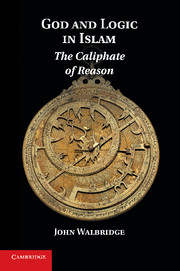Book contents
- Frontmatter
- Contents
- Illustrations
- Preface and Acknowledgements
- Spelling, Names, and Sources
- Introduction
- PART ONE THE FORMATION OF THE ISLAMIC TRADITION OF REASON
- PART TWO LOGIC, EDUCATION, AND DOUBT
- PART THREE THE FALL AND THE FUTURE OF ISLAMIC RATIONALISM
- 9 The Decline and Fall of Scholastic Reason in Islam
- 10 A Chaos of Certitudes: The Future of Islamic Reason
- Selected Bibliography
- Index
9 - The Decline and Fall of Scholastic Reason in Islam
Published online by Cambridge University Press: 01 March 2011
- Frontmatter
- Contents
- Illustrations
- Preface and Acknowledgements
- Spelling, Names, and Sources
- Introduction
- PART ONE THE FORMATION OF THE ISLAMIC TRADITION OF REASON
- PART TWO LOGIC, EDUCATION, AND DOUBT
- PART THREE THE FALL AND THE FUTURE OF ISLAMIC RATIONALISM
- 9 The Decline and Fall of Scholastic Reason in Islam
- 10 A Chaos of Certitudes: The Future of Islamic Reason
- Selected Bibliography
- Index
Summary
THE COLLAPSE OF TRADITIONAL EDUCATION
In 1882, Gottlieb Wilhelm Leitner, the extremely disagreeable Hungarian principal of Government College, Lahore, published a fat book, stuffed with lists and statistics, entitled History of Indigenous Education in the Punjab to the Year 1882. Leitner was a brilliant linguist with a career that was strange even by the standards of the eccentrics of British India. He was born in Budapest in 1840 to a Jewish family and moved to Turkey in 1847. By the time he was fifteen, he knew Turkish, Arabic, and a wide range of European languages, which led to his appointment as an interpreter in the British army with the rank of colonel during the Crimean War when he was still only fifteen. By the age of twenty-one, he was a professor at King's College, London, three years after entering as a student. He received his doctorate at Freiburg in 1862. In 1864 he was appointed the first principal of Government College, Lahore, the nucleus of the future University of the Punjab, the first university in northwestern India. Leitner would disappear for months at a time into the mountains, collecting material for other fat books on the languages and cultures of the isolated valleys of the Afghan frontier. This book, however, was part of another project, a feud that Leitner was conducting with the director of public instruction of the Punjab. (The latter drowned soon after, swept away while crossing a flooded river, to Leitner's barely concealed satisfaction.)
- Type
- Chapter
- Information
- God and Logic in IslamThe Caliphate of Reason, pp. 157 - 169Publisher: Cambridge University PressPrint publication year: 2010



